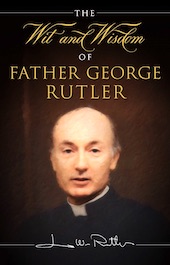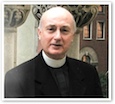The Wit and Wisdom of Father George Rutler
- FATHER GEORGE W. RUTLER
An excerpt (the first three pages) of "The Wit and Wisdom of Father George Rutler".
Absolution and 9/11
 On September 11, policemen and firemen came to priests to be absolved of sin. And even as metal was falling, they would take their helmets off for blessings. There were so many that eventually the priests were giving general absolution the way one does on a battlefield — and this was a battlefield. Seeing that scene, smelling the acrid smoke — which was not just chemical smoke, but the smoke of burning flesh redolent of all the acrid smoke of the modern age, which has consumed men and women, body and soul — the priest was able to say in the Name of Christ, "I absolve you from your sins, in the Name of the Father and of the Son and of the Holy Spirit." Those rescue workers were not going through a formality. They knew what they were getting into, and they knew how to get out of it — not how to get out of earthly death, but how to get out of eternal death. One can ask for absolution only if one knows that there is a True God who will absolve sin. One can speak of sin only if one knows virtue. And one can know virtue only if one knows the ultimate truth that there is a God in whose image we are made. In other words, we have an intellect and a will that can reflect the offering of God, who, in a gratuitous act, said, "Let there be life." All virtue is a participation in that life.
On September 11, policemen and firemen came to priests to be absolved of sin. And even as metal was falling, they would take their helmets off for blessings. There were so many that eventually the priests were giving general absolution the way one does on a battlefield — and this was a battlefield. Seeing that scene, smelling the acrid smoke — which was not just chemical smoke, but the smoke of burning flesh redolent of all the acrid smoke of the modern age, which has consumed men and women, body and soul — the priest was able to say in the Name of Christ, "I absolve you from your sins, in the Name of the Father and of the Son and of the Holy Spirit." Those rescue workers were not going through a formality. They knew what they were getting into, and they knew how to get out of it — not how to get out of earthly death, but how to get out of eternal death. One can ask for absolution only if one knows that there is a True God who will absolve sin. One can speak of sin only if one knows virtue. And one can know virtue only if one knows the ultimate truth that there is a God in whose image we are made. In other words, we have an intellect and a will that can reflect the offering of God, who, in a gratuitous act, said, "Let there be life." All virtue is a participation in that life.
Grace and Truth (2019)
Acts
The Gospel issues in a Book of Acts, not a Book of Ideas.
He Spoke to Us (2016)
John Adams, John Quincy Adams, and Islam
It is fair to read John Adams's sense of Islam in his son John Quincy Adams's distillation of it:
The precept of the Koran is perpetual war against all who deny that Mahomet is the prophet of God. The vanquished may purchase their lives by the payment of tribute; the victorious may be appeased by a false and delusive promise of peace; and the faithful follower of the prophet may submit to the imperious necessities of defeat: but the command to propagate the Moslem creed by the sword is always obligatory, when it can be made effective. The commands of the prophet may be performed alike, by fraud, or by force.2
Adams was aware not only that Islam promoted history's largest slave system, including over a million Europeans and tens of millions of Africans, but that it had even nibbled at New Englanders. In 1625, Governor William Bradford lamented that one of the Massachusetts Bay Colony's ships, in the English Channel within view of Plymouth, had been boarded by Turks who took the captain and crew as slaves to Morocco. The sultan there, Moulay Ismail, pride of the Alaouite dynasty, kept twenty-five thousand white slaves. He was known to test his latest axes and knives on slaves, but for that purpose he used Africans.
He Spoke to Us (2016)
Adoration
As a parish, as an archdiocese, and as members of the Universal Church, we may convert a troubled world and reconvert our own souls by making adoration the first motion of our day and the constant motive of our lives.
A Year with Fr. Rutler (2017)
Advent
Advent became widely observed by the seventh century in Spain and has a longer history and length in the Eastern Church. While its penitential nature is less pronounced than that of Lent, its tone and liturgical customs are clear about its sobriety. I recall the folded chasubles of Advent and Lent, symbols of austerity like draping statues and covering altar paintings. If a soul sorely tried does not yield to cynicism out of pride, it can return to anticipation out of humility.
The Stories of Hymns (2014)
The Aesthetics of Worship
Neglect of the aesthetics of worship is not remedied by the worship of aesthetics.
Calm in Chaos (2018)
All History
All history is the Emmaus Road.
He Spoke to Us (2016)
No Almsgiving, No Heaven
The gates of heaven will not open to those who shut their own gates in this world.
Hints of Heaven (2014)
A Dreadful Amnesia
The clarion message of Ars is this: there is a more perilous impediment to holiness than misdeeds, and it is tepidity. The human soul can share, above even angelic knowledge and love, in the intelligence and nature of God Himself, but only through divine union. Goodness is a fruit of the Christian life; it is not the tree itself. Thus, the symbol of salvation is the Cross and not the holy Commandments, for holiness as a state more profound than conformity to moral precept requires identity with the salvific sacrifice of Christ: “Father, I desire that they also, whom thou hast given me, may be with me where I am" (John 17:24).
The Calvinist moral tradition had been uprooted from the unitive vision of the natural law; consequently, the common environment of much Western culture has a deontological morality, aware of legal precepts but unaware of holiness as their end. It festers even among nominal Catholics, who become indigenized to its cultural matrix. People then can ask in perfect seriousness,“ Is such-and-such still a sin?" and they can think that if a mortal sin is legalized by the civil courts, then it is not a sin at all. The lukewarm spirit lacks the resolve to investigate the inconsistencies of these errors; certainly, it lacks the courage for sacrificial worship. A veritable hallmark of the tendency, in fact, is the decline of the high concept of the Eucharist as a sacrifice; it is easier for tepidity to find expression in ritual fellowship meals and the like when it has not yet slid out of religious customs altogether. The Saint of Ars stands as a refutation of the mediocrity of both the old deists and their new counterparts, who have celebrated life in ways that have forgotten how to celebrate death and Resurrection. By a dreadful amnesia of all that makes the soul breathe, the blood of Calvary and the white of Easter have been blended through the alchemy of reductionism into a sentimental pink.
The Curé d’Ars Today (1988)
Elizabeth Anscombe
Elizabeth Anscombe was too Catholic to be patient with third-rate feminism, outward appearance notwithstanding. Elizabeth always wore trousers. Entering the apostolic palace to see the pope, she approached the gate in trousers and pulled a string, lowering her skirt like a parachute. Her last conscious act on her deathbed was to kiss her husband, but she abjured her married name. Telephoning her in Cambridge from Oxford, which is possibly the world’s longest long-distance call, I asked to speak with Mrs. Geach. "There is no such person," said the voice before hanging up. A second call to "Professor Anscombe" initiated a friendly conversation with no allusion to the faux pas. She had been diligent in securing an academic posting for me in Oxford, but she could also be absentminded. Her young children wandered along the canal with signs pinned to them: "Do not feed me, I am a Geach." She was, nevertheless, an utterly devoted mother.
Cloud of Witnesses (2009)
2 The American Annual Register for the Years 1827-8-9 (New York: E. and G. W Blunt, 1830), 274.
 This is Meaghen Gonzalez, Editor of CERC. I hope you appreciated this piece. We curate these articles especially for believers like you.
This is Meaghen Gonzalez, Editor of CERC. I hope you appreciated this piece. We curate these articles especially for believers like you.
Please show your appreciation by making a $3 donation. CERC is entirely reader supported.

Acknowledgement
 Father George W. Rutler. An excerpt from The Wit and Wisdom of Father George Rutler (Manchester, NH: Sophia Institute Press, 2020): 3-6.
Father George W. Rutler. An excerpt from The Wit and Wisdom of Father George Rutler (Manchester, NH: Sophia Institute Press, 2020): 3-6.
Reprinted with permission from Sophia Institute Press.
The Author
 Father George W. Rutler is the pastor of St. Michael's church in New York City. He has written many books, including: The Wit and Wisdom of Father George Rutler, The Stories of Hymns, Hints of Heaven: The Parables of Christ and What They Mean for You, Principalities and Powers: Spiritual Combat 1942-1943, Cloud of Witnesses — Dead People I Knew When They Were Alive, Coincidentally: Unserious Reflections on Trivial Connections, A Crisis of Saints: Essays on People and Principles, Brightest and Best, and Adam Danced: The Cross and the Seven Deadly Sins.
Father George W. Rutler is the pastor of St. Michael's church in New York City. He has written many books, including: The Wit and Wisdom of Father George Rutler, The Stories of Hymns, Hints of Heaven: The Parables of Christ and What They Mean for You, Principalities and Powers: Spiritual Combat 1942-1943, Cloud of Witnesses — Dead People I Knew When They Were Alive, Coincidentally: Unserious Reflections on Trivial Connections, A Crisis of Saints: Essays on People and Principles, Brightest and Best, and Adam Danced: The Cross and the Seven Deadly Sins.




